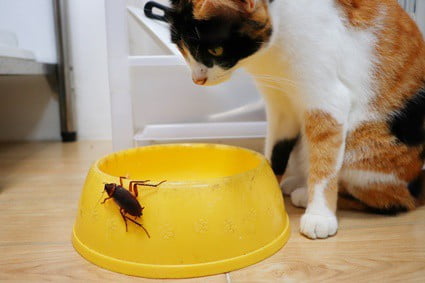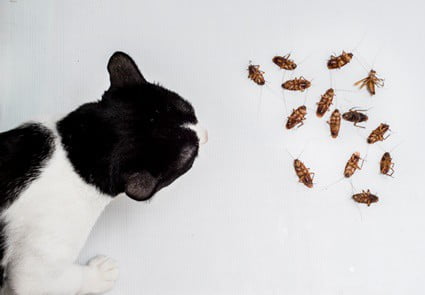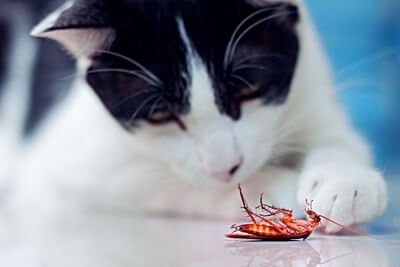Cats love to hunt bugs, including cockroaches. When a cat’s predatory instincts are strong, it’ll eat the cockroaches they’ve caught. Can cats get sick from eating cockroaches?
While cockroaches contain protein and vitamin B12, they’re unsanitary insects that harbor parasitic worms and bacteria that make cats sick. Their strong exoskeletons can cause oral irritation and gastrointestinal upset so, if a cat eats a poisoned cockroach, it can become ill.
Cockroaches multiply quickly and infest homes, making life intolerable. As a result, it’s tempting to set your cat loose on the infestation, but this means that your cat’s at risk of sickness or injury.
Is It Normal For Cats To Eat Cockroaches?
Insects are a natural food source for cats, especially feral cats that hunt to eat. Cats are opportunistic eaters, and insects make up around 1/3 of a cat’s diet.
Comparative Biochemistry and Physiology describes how cats will eat whatever they can find, consuming small meals and adjusting their intake to reflect the amount of food available.
Similarly, cats want to hunt anything that moves, including cockroaches and flies. As soon as a cockroach scurries off, a cat’s curiosity is piqued, and it’ll want to flex its predatory skills.
Are Cockroaches Good for Cats?
Cats need a nutritionally balanced diet that’s rich in vitamins and minerals. Without this, they’ll become malnourished and prone to various health conditions.
Cockroaches offer the following nutritional benefits:
Protein
Cockroaches are a good source of animal protein. While cats would need to eat many cockroaches at a time to get the protein they need, they’re a complete source and provide cats with a protein boost.
Cockroaches have more protein than crickets, containing 35% compared to a cricket’s 21%. Cockroaches have all the amino acids – the building blocks of protein – that a cat needs to remain healthy.
Cats need protein for the following reasons:
- Build and repair tissue and organs
- Regulate metabolism
- Create energy
- Fuel the nervous system
- Maintain muscle mass
Vitamin B12
Cockroaches contain large amounts of vitamin B12. A study by Food Chemistry shows that cockroaches are higher in vitamin B12 than mealworms, crickets, and grasshoppers. See below:
- 1.08 µg per 100 g of mealworm
- 2.88 µg per 100g of cricket
- 0.84 µg per 100 g of grasshopper
- 13.2 µg per100 g dry weight of cockroach
Vitamin B12 is essential for the immune system, digestive system, digestive tract, and cognitive function.
Cats don’t produce vitamin B12, so they must get it from dietary sources.
A vitamin B12 deficiency can lead to:
- Digestive issues
- Nausea
- Vomiting
- Loss of appetite
- Lack of mobility
- Limb weakness
- Neurological problems
Can Cockroaches Hurt Cats?
Cockroaches aren’t toxic for cats to eat, but that doesn’t mean they’re safe.
Cockroaches are unsafe for cats to eat for the following reasons:
Poison
The cockroach that your cat has eaten may have been poisoned. Unfortunately, poisoned cockroaches are often slow and sluggish as the toxins kill them, making them easier to catch and eat.
Even small traces of poison are enough to make your cat sick through secondary poisoning. If your cat has eaten more than one cockroach, it may become unwell quickly.
If a cockroach has poisoned your cat, you’ll notice the following:
- Vomiting
- Salivation or drooling
- Breathing difficulties
- Diarrhea
- Persistent twitching
- Skin inflammation
- Fitting
- Collapse
- Changes to urination
- Dehydration
Without vet intervention, your cat’s nervous system could stop functioning.

Oral Irritation
Cockroaches have protective exoskeletons (thick, cartilage-like coverings).
The Department of Integrative Biology found that cockroaches can withstand weights up to 300 times their own in small crevices and 900 times their weight in other situations.
They’re able to do this due to their flexible, strong exoskeleton. So, cats can suffer from oral irritation from the small pieces after chewing on them, causing inflammation and pain inside the mouth.
Other symptoms of oral irritation include:
- Bad breath
- Drooling
- Bleeding gums
- Excessive swallowing
- Pawing at the face
- Teeth chattering
The cat may experience loss of appetite and weight loss as it struggles to eat while its mouth heals.
Gastrointestinal Upset
While the exoskeleton causes oral irritation, it can cause stomach problems. Large, rough exoskeleton pieces irritate the stomach as they’re digested, causing nausea, vomiting, and diarrhea.
Cats with food intolerances or allergies are most likely to have an adverse reaction to eating a cockroach.
Other symptoms of gastrointestinal upset include:
- Excessive lip-licking
- Loss of appetite
- Weight loss
- Lethargy
- Yowling
- Hiding
Parasites
Cockroaches have been found to carry 33 different bacteria and 6 parasites, many of which are responsible for causing harmful diseases that cats are prone to.
The most severe medical conditions include:
- Gastroenteritis
- Dysentery
- Salmonella
- E. Coli
- Poliomyelitis
Bacterial diseases are usually caused by contaminated food, including cockroaches. Cats with weakened immune systems are most affected because they can’t fight off the harmful bacteria.
According to the Journal of Parasitology Research, cockroaches carry parasitic worms, such as:
- Ascaris
- Trichuris
- Capillaria
- Toxocara
- Hook worm
- Eimeria
Worms can infect cats and live inside their intestines, feeding off the body’s nutrients. Cockroaches found by cats in toilets are most likely to carry worms, followed by cockroaches found in kitchens.
Cats with worms display several noticeable signs, including:
- Sickness
- Diarrhea
- Weight loss
- Increased appetite
- Dull coat
- Lack of energy
- A swollen or distended belly
- Excessive cleaning of the area around the bottom
- Blood in feces
- Abdominal pain
Cats left with untreated worms eventually suffer from anemia and blocked intestines.
How Do Cats Detect Cockroaches?
Cats have hearing, smell, sight, and vibration detection skills.
Because cockroaches aren’t the quietest or cleanest creatures, they’re not difficult for cats to detect.
This is how cats find cockroaches:
Can Cats Smell Cockroaches?
A cat’s sense of smell is 14 times better than humans, with 70,000 smell receptors compared to 20,000.
They can also taste smells with a sensory organ at the back of their mouths called the Jacobson’s organ. When cats taste a scent, they produce the flehmen response.
Cats do this to hold the air molecules with their tongue, pushing them to the Jacobson’s organ. This allows them to smell potential and locate cockroaches.
Similarly, cockroaches emit a distinctive musty odor that worsens over time because cockroaches store uric acid in their fat.
According to the National Science Foundation, cockroaches store waste nitrogen in the form of uric acid instead of excreting it like other insects. When they die, the acid is released, leaving a pungent stench.
Cockroaches give off pheromones that allow them to communicate with each other. Dead cockroaches smell even worse because, when they die, their carcasses release oleic acid (death stench).
Due to your cat’s smelling capabilities and a cockroach’s distinctive odor, it’s easy to locate cockroaches.
Can Cats See Cockroaches?
Cats have a sophisticated sense of sight, allowing them to identify cockroaches at night when they’re most active.
Cats have a reflective layer of tissue behind the eye’s retina called the tapetum lucidum. This allows cats to see 7 times better than humans in the dark by bouncing light back to the sensory cells. This allows the retina to receive more than 50% of available light.
Cats have more rods in their eyes, making it easier to see in dimmer light. Their pupils expand widely, allowing them to take in more light to help them see better.
As houses are rarely pitch black, cats have access to enough light to see cockroaches at night.
Can Cats Hear Cockroaches?
When cockroaches are in colonies, they make some noise. Many species make a chirping sound, and some create acoustic vibrations by rubbing their legs or wings together. You can also hear them scuttling around in cabinets and walls.
Cats can hear up to 64kHz, while humans can hear to 20kHz. They move their ears back and forth to locate the sound and can find them 3 inches from where they originate, even if they’re a yard away.

Can Cats Feel Cockroaches?
Cats can detect cockroaches with their whiskers.
The whiskers pick up even the slightest movements and vibrations. Cats also have whiskers on their legs, which allows them to become aware of their surroundings.
To make them work effectively, cats have 100-200 nerve sensors per whisker, allowing them to translate irregularities of something they’ve brushed past to be translated into movements.
As a cockroach scurries across the floor, the whiskers detect the movement and give cats information about its direction and duration.
Are Cats Good Cat Killing Cockroaches?
Cockroaches are large, distinctive insects, so they’re easy for cats to spot. However, cockroaches are fast movers that get into small gaps and cracks, making them hard for cats to catch.
Many cats love the thrill of the hunt and spend hours stalking their prey, waiting for them to emerge from their hiding spaces. Cockroaches eventually need to leave the safety of their shelter to find food. However, your cat may become bored if it stops seeing cockroach hunting as a fun game.
That said, a cat’s presence can prevent cockroaches from infesting the entire home. Cockroaches can recognize danger and warn each other using pheromones. If their colony’s becoming depleted by a cat, they’ll stay in the safe part of their environment.
Do Cockroaches Bite Cats?
Cockroach bites are uncommon and usually occur when the colony outgrows its food source.
In extreme hunger cases, cockroaches feed on a cat’s outer skin when no other food is available. Cockroach bites make the skin sore, itchy, and inflamed.
However, cockroaches don’t tend to get close enough to live animals and prefer to feed on dead skin where there’s no risk of danger.
Cats shouldn’t be encouraged to eat cockroaches, even if you have an infestation. Cockroaches are unsanitary and harbor diseases that make cats unwell. While they’re a good source of protein and B12, providing cats with a healthy diet gives them all the nutrients they need.


Thank you for this very informative article. I have a six week old kitten and unfortunately I have cockroaches in my kitchen. I’ve been very worried about this situation but your article puts me at ease knowing that if I don’t get all the cockroaches all the time they will not simply kill the kitten. I try various methods rid of them but never anything poisonous to animals.